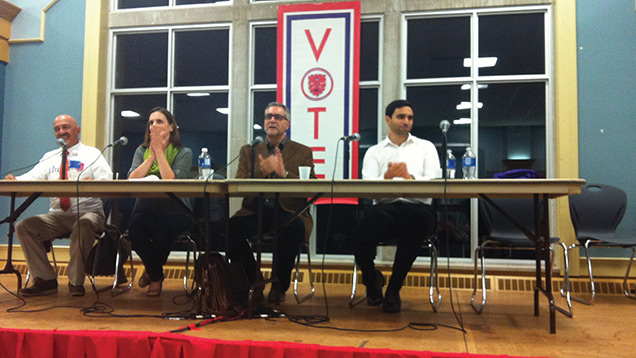Conservative MP Susan Truppe a no show at Sept. 21 debate
 CREDIT: DANIEL TODD
CREDIT: DANIEL TODDThe debates for the London North Centre riding discussed the economy, Bill C-51, Bill C-24, and the economy. NDP's German Gutierrez, Liberals' Peter Fragiskatos and Green Party's Carol Dyck all had differentiating views on the topics and Conservatives' MP Susan Truppe was a no show.
Some hot topics of the London North Center federal candidates debate held on Sept. 21 at Western University were the environment, the economy, Bill C-51, Bill C-24 and Conservative MP Susan Truppe's absence.
In his opening statement, Liberal candidate Peter Fragiskatos said that it's important that the public understands why he's running, and it's because he's worried about the future that young people and other Londoners are facing.
“Canada and London could be doing so much better and I hear that at the door every single day. Part of doing better means recognizing that politics isn't about photo-ops. It's about showing up.”
He went on to say that we need representatives who are willing to work with all levels of government so that communities can prosper. The Liberal plan involves supporting the middle class and investing in infrastructure to overcome our economic decline.
Green Party candidate Carol Dyck spoke of her experience living abroad in the ‘90s and hearing how Canada was thought so highly of around the world. Our reputation was that of a progressive, environmentally minded country, whose military focused on peacekeeping missions.
“We are no longer a nation that others may wish to emulate.”
She continued with pointing out that Canada is the only nation to have pulled out of the Kyoto protocol, which commits state parties to reduce greenhouse gas emissions, and that we are the only nation that has filed objections to the UN declaration on the rights of indigenous peoples.
With Canada's sad legacy of residential schools and the continuous disregard for aboriginal rights while energy projects get pushed through without consultation, Dyck says she doesn't think this is the image Canadians want to portray on the world stage.
Her main reason for running is to show people that they don't have to choose between a strong economy and a healthy environment.
NDP candidate German Gutierrez, a professor at Fanshawe College in the School of Language and Liberal studies, says he's able to see the struggles that students go through with finances and finding their place in the world. He says that their voice is more important now than ever before, and urges them to take the responsibility of directing their future.
“Above all I'm a student at heart and I'm looking forward to learning from you tonight as part of that experience.”
�He ended off with saying that people should vote for the party they think will make the best changes, as opposed to just voting against a party they don't want in power.
The debate included a formal question round, which grilled candidates on public spending, youth initiatives and foreign policy,
Dyck began by saying that the Green Party understands that the way to get out of a recession is to invest in the economy.
Part of their plan is also to get rid of fossil fuel subsidies, and raise corporate tax rates back up to 19 per cent.
Gutierrez said the NDP plans on investing in better health care and affordable childcare. They also plan on creating more apprenticeships and job opportunities so young people can start making a living earlier.
Fragiskatos spoke of the GDP to debt ratio, and the Liberals' proposal to run a small deficit for three years, in order to make investments, in order for the next generation to be closer to having a balanced budget. He emphasized that investing in transit is crucial to London's future, especially because of the high student population.
Gutierrez then referenced an innovation tax credit to invest in machinery, equipment and property that will be used for research and development. The NDP also plans to lower tax rates on small businesses.
Fragiskatos said the Liberals will cut taxes for middle class citizens, and provide them with more benefits. He also focused on the fact that the Liberals will increase funding for research and innovation, which Dyck agreed with for the sake of developing more sustainable technologies. They also both cited youth unemployment rates, but the Green Party also plans to abolish tuition and ban unpaid internships. All three candidates agreed that too many college and university graduates are either underemployed or unemployed.
Fragiskatos began the next question by stating that we can't make combat missions the basis of our foreign policy and that Canada is now very low on the list of peacekeeping nations. He claims “Harper has forgotten our veterans”. Fragiskatos also said the Liberals plan to reinstate lifetime pensions for vets.
The Green plan is to take money out of NATO combat missions and put it into UN peacekeeping missions. Dyck says that would be better aligned with Canadian values.
Gutierrez, whose father sat on the UN Security Council, said he grew up with Canada leading by the example of peacekeeping, but that Canada is gone now.
Finally they got to Bill C-51.
Fragiskatos emphasized that we need a balance between security and freedom, and called it a “lousy piece of legislation”. The Liberals would put in an oversight committee to ensure the bill wasn't abused by security organizations, as well as a “sunset clause” that would see the bill reviewed and possibly repealed in three years' time.
Dyck called the bill ambiguous and said that repealing it is a top Green Party priority because it infringes on Canadian political and civil rights.
Gutierrez says that it's a slippery slope into a police state from legislation such as C-51, as well as Bill C-24.
The federal election will be held on Oct. 19. When voting, choose a leader whose policies best suit a Canada we all can be proud of.














